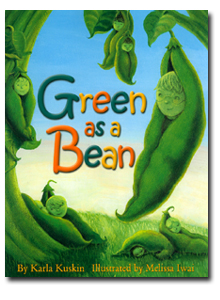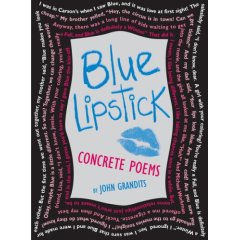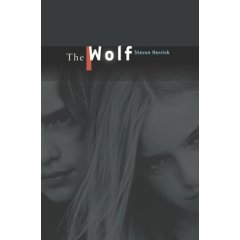Poetry Friday: Poetry across the board —
Kuskin, Grandits, & Steven Herrick
 September 21st, 2007 by jules
September 21st, 2007 by jules
I know I’m going to look insufferably and nerdily overachieving here, but I’m using my turn for this Poetry Friday to highlight three poetry books across the board, so to speak — picture book, middle-grade, and YA (actually, the Grandits book is more squarely aimed at teens, but it’d work just dandy for a middle-school reader as well). That’s because I can’t choose which to highlight today, not to mention I’ve been feeling rather behind on reviews lately. Here goes:

by Karla Kuskin
Illustrated by Melissas Iwai
Laura Geringer Books
January 2007
(library copy)
How has it taken me over three-quarters of the year to find this title? It’s wonderful. Portions of it were previously published in 1960, but here it is now with warm, ebullient illustrations from Melissa Iwai. In this rhyming text, Kuskin — winner of the NCTE Award for Excellence in Poetry, among many other honors — offers the child reader a series of imaginative hypothetical questions: “If you could be green/ would you be a lawn/ or a lean green bean/ and the stalk it’s on?/ Would you be a leaf/ on a leafy tree?/ Tell me, lean green one,/ what would you be?” . . . The other hypothetical questions proposed to the reader involve being square, soft, loud, small, red, fierce, blue, and bright (“Tell me, quite bright one,/ what would you be?”) with a slightly surreal mind-bender proposed at the end. It’s a book to delight and engage in, to share with a group of children at story time, and ponder the world around and the qualities of it. And, as the Booklist review pointed out, Kuskin uses the sound of her words and their meaning to great effect (“If you could be small/ would you be a mouse/ or a mouse’s child/ or a mouse’s house/ or a mouse’s house’s/ front door key?”). Iwai’s imaginative acrylic paintings are soft, fanciful when they need to be and playful-with-perspective in just the right spots. A lively pre-school book, to share either one-on-one or in an interactive story time hour.

by John Grandits
Clarion Books
May 2007
(library copy)
This is a follow-up title to Grandits’ 2004 anthology of original concrete poems, entitled Technically, It’s Not My Fault, also published by Clarion Books (which I’ve not read but Eisha enjoyed), this title following Jessie, a high schooler with fervent opinions about her pesky younger brother, Robert (who narrated the first anthology); designing her own clothes; volleyball; her cat; “stupid pep rallies” (“I’m not feeling peppy, and the pep rally isn’t helping”); and much more. Book and magazine designer Grandits scores with these visually-enticing poems whose very shapes echo their subject matter, the words and type and design coming together to make a poem and a picture — an hourglass for “Allergic to Time,” a graph which charts out Jessie’s day in “My Absolutely Bad Cranky Day,” and the spray of a shower in “All My Important Thinking Gets Done in the Shower.” In “Go look in the mirror!”, the poems are written backwards in the shape of an oval looking-glass, and in “Zombie Jocks” (“Trophy, trophy, trophy, trophy./ Zombie jocks, we want the trophy . . . Give the zombie jocks the trophy”), the poem is encased inside a dark, black form who is the living dead, complete with the word “trophy” for each eye, with the “tro” place on top of the “phy” and six sideways “Z”s for a mouth. (Yes, I really wish I could show you these). It would be one thing if the entries in this collection of concrete poems were conceived poorly — all style and no substance, if you will — but it’s a realistic, funny, and sometimes poignant look at a high schooler who is thoughtful yet refreshingly sarcastic, too. She also comes to understand that the surface of things isn’t always what it seems: In one of the first poems, “The Wall,” she writes: “Life is simpler if/ you have a wall./ It keeps away people who drag/ you down . . .” There is a brick wall in the middle of the page and a “My Side” on the left and “The Other Side” on the right. The poem is revisited at the close of the book, and Jessie has made way for people like Robert and even a “cheerleader who turned out to be a regular person — annoyingly pretty, but a regular person.” School Library Journal wrote: “This irreverent, witty collection should resonate with a wide audience.” Enthusiastically recommended, particularly for poetry units at the high school level.

by Steven Herrick
Front Street
First U.S. Edition: March 2007
(Originally published in Australia in 2006)
(library copy)
I’ve made it clear before — here and here — that I’m a fan of Australian writer Steven Herrick’s free verse novels. And his latest delivers, too, as a moving story of self-discovery about a sixteen-year-old girl named Lucienne Harding, or “Lucy” for short; she lives with an abusive father, whose wrath in life she is trying to escape. In his evocative, precise, and spare free verse, Herrick takes us to a rugged, isolated Australian town near Sheldon Mountain, where a wolf, the stuff of legend, is said to roam; wolves are not said to live in that part of the country. But Jake’s dad saw it once before fifteen-year-old Jake was even born. Lucy and Jake are neighbors, Jake’s home life a happy one and Lucy living in fear on Battle Farm with her abused mother, her brother Peter (“who’s twelve, but acts like he’s eight”), and her cruel alcoholic father, “the old bastard”:
Mostly I stay out of his way.
Simple as that.
At dinner I eat quicker than I should
and keep my head down.
Whenever anybody asks me
to get the cordial from the fridge
or the salt from the pantry,
I do it without a word.
Don’t think I’m weak.
I’m not.
I’m snarling underneath
and they know it.
I’m doing what I’m told to avoid getting hit.
Herrick seamlessly alternates Lucy’s point-of-view with Jake’s, and eventually they head out together into the mountainous terrain in search of the wolf, who Lucy believes is simply a feral dog who was once a pet of theirs. Things don’t go as planned, their trip turning into a rather disastrous overnight venture, and I don’t want to give away any major spoilers, but suffice it to say that it’s there, finally having escaped her father both physically and emotionally, that Lucy — with Jake’s help — comes into her own, finding the strength to stand up for herself as she works through her feelings about both the legendary creature and her brute of a father (“The symbolic richness of the beast itself — part myth and part shadow, destroying and surviving, infuriating and inspiring — becomes a provocative lens for viewing both the men who struggle to find a livelihood and the children who inherit their successes and failures,” wrote VOYA). How Herrick skillfully brings about Lucy’s transformation makes for a compelling and tender story: In the novel’s opening, she tells us, “I grew my hair long/ and let it fall in front of my face,/ to hide my eyes from his hate./ To hide my hate from his eyes,” and after receiving love for the first time in her life, as she does with Jake in the mountains, she writes:
I’ve seen things
that I knew, there and then,
were going to get to me.
I’ve seen bad
thundering through our house
and it made my stomach churn
and every muscle in my body
grow tense like cold wire.
I’ve hidden under the house
in the dirt
like a cornered animal
waiting for the jaws
to snap shut.I was powerless to stop his rampage.
I don’t want to feel like that anymore.
That kiss from Jake changes everything.
It changes everything for good.
Herrick is an expert storyteller and does free verse well. Highly recommended.

Thanks for the reviews. The Wolf sounds really good.
I’m running off to yoga, but I’ll be back to read all this and comment, you nerdy overachiever, you!
Oh, lots of meat here … much appreciated!
Wow — that Herrick book sounds like it is completely made of awesome. Thanks for posting about it!
I’m not feeling peppy, and the pep rally isn’t helping” was my high school introverted manifesto.
I love Karla Kuskin, but I don’t seek out new picture books (unless the bloggers tell me to read them), so thank you for calling this title to my attention. I’m off to place more library holds…
I think I remember seeing a cheerleader poem from Blue Lipstick in the Horn Book…it was quite amusing. I’m going to look for this one. Well, all of them! How can I resist three completely different takes on poetry: rhymed, concrete, and free verse? You are a most excellent, nerdy book-spotter, jules. Book-spotter IS a profession, right?
Jules,
I’m glad I read your review of GREEN AS A BEAN. The first time I read it I was quite disappointed. I was really excited when I picked the book up at the store because I love Kuskin’s poetry and was happy to see poems from one of her out of print books back in print. I do find I like the book much better upon rereading it. I think that I’m sometimes not in the mood to appreciate a particular book–and then find I like it better the second or third time around.
I can see how GREEN AS A BEAN could be a great spark for a creative writing exercise in an elementary classroom.
Thanks for the review.
BTW, I just picked up a copy of BLUE LIPSTICK a few days ago. I haven’t read it yet.
Sara, yes, the “bOObs” poem was in The Horn Book.
Thanks, all, for the comments! Elaine, hope you grow to like the picture book with each read, but, hey, if you don’t, that’s okay, too.
A “cheerleader who turned out to be a regular person”–I still talk like this even though I am way past high school; I better look for the book!
Oh, they all look interesting but I love the illustrations on the cover of GREEN AS A BEAN. Must get it.
poetry is some stuoid crap
poetry is some stupid crap